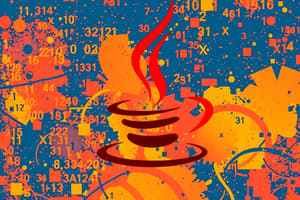Podcast
Questions and Answers
Java consists of JDK, JRE, and JVM, which are dependent on the same machine architecture.
Java consists of JDK, JRE, and JVM, which are dependent on the same machine architecture.
False (B)
Bytecode in Java has a '.class' extension and can be transferred between different platforms.
Bytecode in Java has a '.class' extension and can be transferred between different platforms.
True (A)
The Java Development Kit (JDK) includes only the Java Compiler and excludes other components.
The Java Development Kit (JDK) includes only the Java Compiler and excludes other components.
False (B)
The Java Virtual Machine (JVM) is responsible for translating Bytecode into machine code specific to the platform it is running on.
The Java Virtual Machine (JVM) is responsible for translating Bytecode into machine code specific to the platform it is running on.
Java Runtime Environment (JRE) includes both the Java Virtual Machine (JVM) and the Java Development Kit (JDK).
Java Runtime Environment (JRE) includes both the Java Virtual Machine (JVM) and the Java Development Kit (JDK).
Flashcards
What is Bytecode?
What is Bytecode?
Bytecode is the intermediate code generated when Java's source code is compiled. It's platform-independent and has a '.class' extension.
What is Java Virtual Machine (JVM)?
What is Java Virtual Machine (JVM)?
The JVM is a platform-dependent program that translates Bytecode into machine code, allowing Java to run on different operating systems.
What is Java Runtime Environment (JRE)?
What is Java Runtime Environment (JRE)?
The JRE includes the JVM and essential libraries required to run Java programs. It's used for executing Java applications.
What is Java Development Kit (JDK)?
What is Java Development Kit (JDK)?
Signup and view all the flashcards
How is Bytecode used for platform portability?
How is Bytecode used for platform portability?
Signup and view all the flashcards
Study Notes
Java Platforms
- Java's unique platform is based on its architecture, specifically its bytecode.
- Java consists of three key components: JDK, JRE, and JVM.
- JDK (Java Development Kit) combines JRE and developer libraries.
- JRE (Java Runtime Environment) includes JVM and runtime libraries.
- JVM (Java Virtual Machine) translates bytecode to machine code; it's platform-dependent.
Bytecode
- Bytecode is created when Java source code is compiled.
- Bytecode files have a ".class" extension.
- Bytecode can easily be moved between different platforms without modification.
- Bytecode can also be packaged in a Java Archive (JAR).
Studying That Suits You
Use AI to generate personalized quizzes and flashcards to suit your learning preferences.



